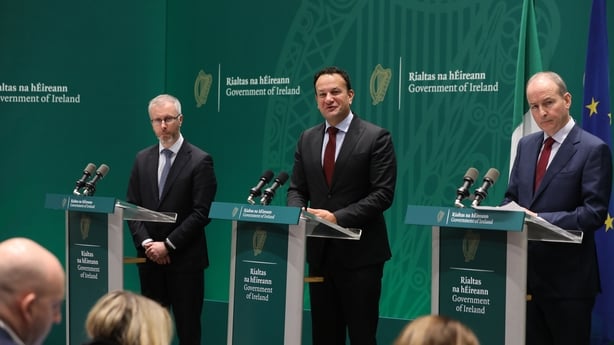The Government has confirmed plans to hold referendums on constitutional references to family and care in March 2024.
The proposed referendums, to be held on International Women's Day on 8 March, would broaden the definition of family beyond marriage in the constitution.
There would also be a new reference to carers to recognise all those who provide care and to remove the reference to women's duties in the home from the constitution.
Making the announcement, Minister for Integration Roderic O'Gorman said that "a woman's place is where ever she wants it to be".
The 39th Amendment, which deals with the definition of family, proposes to amend Article 41.1.1 to insert the words "whether founded on marriage or on other durable relationships".
It also proposes the deletion of the words "on which the Family is founded" from Article 41.3.1.
We need your consent to load this rte-player contentWe use rte-player to manage extra content that can set cookies on your device and collect data about your activity. Please review their details and accept them to load the content.Manage Preferences
The 40th Amendment deals with the role of women in the home.
It proposes to delete Article 41.2 and replace it with an Article 42B, which reads: "The State recognises that the provision of care, by members of a family to one another by reason of the bonds that exist among them, gives to society a support without which the common good cannot be achieved, and shall strive to support such provision."
Read/Watch
Explained: Plans to hold gender equality referendum
Taoiseach Leo Varadkar noted that the Citizens' Assembly and Oireachtas Committee on Gender had made three recommendations and said the Government will implement two of them, citing legal advice in its decision not to pursue the third.
Firstly, the Government will propose that Article 41 of the Constitution be amended so that its protections "are not limited to the marital family", Mr Varadkar said.
This "protective shield or canopy" would be extended to include those families headed by - for example - a lone parent, grandparent or guardian.
This proposed change acknowledges that some families are founded "on lasting relationships other than marriage" and will "enable the Constitution to catch up with contemporary reality", the Taoiseach said.
The Government is also proposing "to remove the reference to a woman's life in the home" which "no longer reflects modern social norms".

Instead, if approved, Article 41.2 would be replaced with a new article "that would recognise that care provided by family members to each other is a public good", Mr Varadkar said.
However, the Government will not pursue the third and final proposal to amend Article 40.1 "to refer explicitly to gender equality and non-discrimination".
The Taoiseach cited legal advice that warned that such a change "could weaken the all-encompassing commitments to equality within the Constitution", which hold that: "All citizens shall as human persons be held equal before the law".
To elevate "any particular category" - such as sex-based discrimination - could "unwittingly downgrade others" - such as race or disability, he said.
The Government took each proposal "very seriously", Mr Varadkar said, and he acknowledged that "there has been some criticism" of the Government for not moving "more quickly" on this.
However, changes to the Constitution "should not be taken lightly", he said.
Public debate should be conducted in a "respectful manner", but Mr Varadkar vowed that the Government "will push back strongly against disinformation and distraction from any source".
'Sexist language around women and mothers'
In the Dáil, Labour Party leader Ivana Bacik welcomed progress on recommendations to replace "sexist language around women and mothers" in the Constitution.
As the former chairperson of the Committee on Gender Equality, she "expressed disappointment" that language to "recognise care both in the home and indeed in the wider community" was not included.
She asked why the "more restrictive" definition of care was used.
Mr Varadkar said that the recommendations were given "careful consideration" but the decision was made to extend protection "to care within the family. It doesn't necessarily have to be in the home".
"It made sense to give constitutional protections and status to care within the family," Mr Varadkar said.
But "extending that protection to commercial operations in the main, like nursing homes and homecare providers, wouldn't have been the right thing to do", he added.
Professor of Politics at DCU Gary Murphy said that in the 1930s, when the Constitution was written, there were "rows about it at the time" and said it set out the values of the State and what it inspired to be.
Speaking to RTÉ's Drivetime, he said the reference to "a woman's place being in the home", upset women’s groups and he said the current Government wants to give "a wider meaning".
Prof Murphy said that "times have changed" and there is now a different dynamic concerning the concept of the family.

